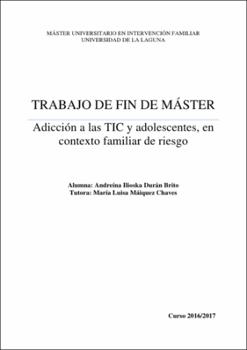Adicción a las TIC y adolescentes, en contexto familiar de riesgo
Fecha
2018Resumen
The world is living in a vertiginous "technologization" process, and it directly
impacts on their processes and social phenomena, leading to a fragmentation and a
modification of human thought and with the immersion in a new uncertain liquid society
(Bauman, 2007). ICT have become a very important social agent for human beings, as
important as family and school; and teenagers have proved to be the most vulnerable group
within this great revolution. It has created some new problematic situations of addiction and
dependence on ICT, compromising their personal integrity and relationships; and setting up
an obvious situations of risk for both parts.
For this TFM, we make a pilot test about this problem, with a 45 teenager’s sample, to
know and evaluate their realities, according to their age and sex; and to detect addiction rates
among some students of the IES Marina Cebrián. The obtained data were compared with
several studies carried out in this area. The main results confirmed the real existence of a high
risk among this teenage population, of suffering technological addictions or being at risk of
suffering them and we confirmed that the family context of the adolescents could be
contributing to the acquisition of technological addictions, among other reasons, due to the
lack of parental control and the sociocultural context. Finally, we also confirmed the presence
of high percentages of device ownership were found in adolescents, and significant variations
in the uses, times, experiences and places dedicated to ICT, for this teenagers, according to
their age and gender. El mundo está inmerso en un vertiginoso proceso de “tecnologización” y esto
repercute directamente en nuestros procesos y fenómenos sociales, dando lugar a una
fragmentación y modificación del pensamiento humano y la inmersión en una nueva e
incierta “sociedad líquida” (Bauman, 2007). Las TIC se han convertido en un importantísimo
agente social para los seres humanos, a la altura de la familia y la escuela; y los adolescentes
han resultado ser el grupo más vulnerable dentro de esta gran revolución. Esto ha creado
nuevas situaciones problemáticas de adicción y dependencia a las TIC, comprometiendo la
integridad de los individuos y sus relaciones personales, y constituyendo evidentes
situaciones de riesgo para ambas partes.
En este TFM se realiza un estudio piloto sobre esta problemática, con una muestra de
45 adolescentes, para conocer y evaluar su realidad, en función su edad y sexo, y para
detectar índices de adicción entre algunos estudiantes del IES Marina Cebrián. Los datos se
compararon con diversos estudios realizados de este ámbito. Los principales resultados
obtenidos, confirmaron la existencia real de un riesgo elevado entre esta población
adolescente, de estar sufriendo adicciones tecnológicas o estar en riesgo de padecerlas y se
confirmó que el contexto familiar de los adolescentes podría estar contribuyendo a la
adquisición de adicciones tecnológicas, entre otras razones, por el escaso control parental y el
contexto sociocultural. Finalmente, se constataron altos porcentajes de tenencia de
dispositivos en los adolescentes, y se confirmaron variaciones significativas en los usos,
tiempos, experiencias y lugares dedicados a las TIC, por parte de estos adolescentes, en
función de su edad y su sexo.




